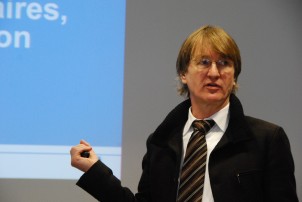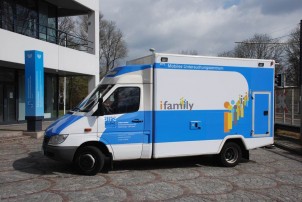From dietary behaviour to physical activity: I.Family researchers present insights into childhood & adolescent health
As the I.Family study enters its final year, we are learning more about the diets and lifestyles of European families. And project researchers will share insights gathered over nearly 10 years into children’s and adolescents’ health at two prestigious international conferences this week and next.
I.Family is hosting a symposium at the inaugural European Obesity Summit (EOS) taking place in Gothenburg, Sweden (1-4 June). The session on Wednesday 1 June, titled ‘Childhood obesity in relation to genes, families and environments’, will be chaired by our coordinator Professor Wolfgang Ahrens from the Leibniz Institute for Prevention Research and Epidemiology – BIPS, and Professor Lauren Lissner of the University of Gothenburg.
“The aim of this symposium is to present our latest results on obesity and related dietary behaviours,” Prof Ahrens explains. “The large number of families we’ve studied, over nearly a decade now, puts us in a fantastic position to understand how different factors affect children’s healthy development, particularly in relation to obesity.”
The I.Family cohort began with 16,000 children enrolled in 2007 in the preceding IDEFICS study, the largest research study on diet and lifestyle-related diseases in children. I.Family has followed these children into their teenage years.
Some of these young participants have taken part in accelerometer and physical activity investigations and this area of I.Family’s research is the subject of a second symposium, taking place during the 15th meeting of the International Society of Behavioural Nutrition and Physical Activity (ISBNPA) in South Africa (8-11 June).
The ISBNPA symposium will be chaired by Dr Angie Page, lead researcher for I.Family from the Centre for Exercise, Nutrition & Health Sciences (University of Bristol), with five other project members from around Europe presenting on different aspects of their research, including Prof Iris Pigeot, deputy I.Family coordinator from BIPS.
She explains, “Large cohort studies such as I.Family that use accelerometers to objectively measure physical activity help advance our knowledge about the relationship between physical activity and health. But interpreting complex data can present challenges, so we’ll be demonstrating I.Family’s methodological advancements and solutions to interpreting data, in order to deliver public health outcomes.”
Prof Ahrens adds, “Both events are excellent platforms to share our work and results. Making connections with other researchers working on similar topics means we can all benefit from each other’s knowledge and experience to further our efforts to address key societal health challenges. I.Family is able to offer a unique perspective and we’re very pleased to contribute to discussions in this field.”
ENDS/Contacts and Notes follow
Media contact for I.Family Study –Kate Viggers/Rhonda Smith +44 (0) 1264 326427/+44 (0) 7887 714957. kate@minervacomms.net or rhonda@minervacomms.net
Notes for Editors:
- The I.Family Study is an EC funded project under Framework 7 of the KBBE programme running from March 2012 to February 2017. It has 17 partners, working across 11 countries and with cohorts in 8 European countries – Germany, Italy, Sweden, Hungary, Cyprus, Estonia, Spain and Belgium.
- The study has two strategic objectives:
(1) Understand the interplay between barriers against and drivers towards healthy food choice;
(2) Develop and disseminate strategies to induce changes that promote healthy dietary behaviour in European consumers especially adolescents and their parents - The I.Family Study is re-assessing the families first engaged with the Identification and Prevention of Dietary- and Lifestyle-Induced Health Effects in Children and Infants Study (IDEFICS), when children were below 10 years of age, now that they move into adolescence – the ‘tween’ years – identifying those families that have adopted a healthy approach to food and eating habits and those that have not. I. Family is adopting a holistic approach by also investigating the biological, behavioural, social and environmental factors that drive dietary behaviour as children journey towards adulthood.
4. I.Family study partners
| Participant organisation | Lead investigator(s) | Key responsibilities |
| University of Bremen, Germany | Wolfgang Ahrens | Project coordinator |
| Leibniz Institute for Prevention Research and Epidemiology – BIPS, Germany | Iris Pigeot | German cohort, statistics |
| Institute of Food Sciences, National Research Council, Italy | Alfonso Siani | Italian cohort, nutritional epidemiology |
| Copenhagen Business School, Denmark | Lucia Reisch, Wencke Gwozdz |
Consumer behaviour & environmental influences |
| University of Lancaster, United Kingdom | Garrath Williams | Ethics, policy, and stakeholder engagement |
| Sahlgrenska Academy at the University of Gothenburg, Sweden | Staffan Mårild, Lauren Lissner |
Swedish cohort, family analysis |
| University of Helsinki, Finland | Jaakko Kaprio | Familial aggregation & genetic modelling |
| University of the Baleares Islands, Spain | Andreu Palou, Catalina Picó |
Genomic analysis |
| University of Pécs, Hungary | Dénes Molnár | Hungarian cohort |
| Rudolf Magnus Institute of Neuroscience, The Netherlands | Roger Adan | Neuroimaging & neuropsychology |
| Research and Education Institute of Child Health, Cyprus | Michael Tornaritis | Cypriot cohort |
| National Institute for Health Development, Estonia | Toomas Veidebaum | Estonian cohort |
| Fondazione IRCCS Istituto Nazionale Tumori, Italy | Vittorio Krogh | Dietary assessment methods |
| University of Bristol, United Kingdom | Angie Page, Ashley Cooper |
Physical activity monitoring |
| Minerva PRC Ltd, United Kingdom | Rhonda Smith Kate Viggers |
Dissemination and communication |
| University of Zaragoza, Spain | Luis Moreno | Spanish cohort |
| Ghent University, Belgium | Stefaan De Henauw | Belgian cohort |
Notes/End
160531-IF-PR21-FINAL







